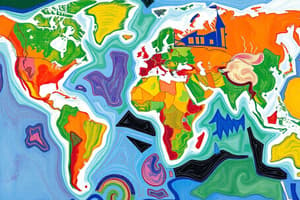Podcast
Questions and Answers
What is the main focus of human geographers?
What is the main focus of human geographers?
- Researching the flora and fauna interactions in diverse ecosystems
- Analyzing migration patterns in animals across terrains
- Exploring topics such as urbanization and social inequality (correct)
- Studying ecosystems and environmental dependence
What are some benefits of urbanization mentioned in the text?
What are some benefits of urbanization mentioned in the text?
- Increased resource depletion
- Rapid deforestation
- Enhanced air and noise pollution
- Improved community connections (correct)
Why do people often move according to the text?
Why do people often move according to the text?
- To decrease job opportunities
- To reduce innovation in society
- To escape poverty or pursue better opportunities (correct)
- To cause overcrowding in urban areas
What do political boundaries between countries help us understand?
What do political boundaries between countries help us understand?
What is the significance of studying social inequality?
What is the significance of studying social inequality?
How does geography view the components of the planet?
How does geography view the components of the planet?
What does physical geography primarily focus on?
What does physical geography primarily focus on?
How do landforms influence human life?
How do landforms influence human life?
What role do bodies of water play in defining habitats?
What role do bodies of water play in defining habitats?
Which factor contributes to creating distinct climates around the world?
Which factor contributes to creating distinct climates around the world?
How can understanding climates help predict weather trends?
How can understanding climates help predict weather trends?
In what ways do bodies of water provide resources to humans?
In what ways do bodies of water provide resources to humans?
Study Notes
Exploring our World's Landscapes: A Geographical Primer
Geography isn't just about maps and memorizing capital cities—it encompasses a broad spectrum of interconnected concepts spanning physical landscapes, human interactions with those environments, and global dynamics. Let's delve into some fundamental aspects of this fascinating discipline.
Physical Geography
At its core, geography is concerned with understanding Earth’s surface through understanding landforms, bodies of water, climates, ecosystems, and their intricate relationships.
Landforms: These natural features, such as mountains, valleys, plateaus, and hills, largely determine how people live on the planet. They influence everything from transportation routes and agricultural potential to cultural identity and recreational opportunities.
Bodies of Water: Oceans, lakes, rivers, and other water bodies define both terrestrial and aquatic habitats. Their impacts range from shaping climate patterns, supporting biodiversity, influencing trade routes, and providing vital resources like fish.
Climates: Temperature, humidity, precipitation, wind patterns, and cloud cover contribute to creating distinct climates around the world. Understanding these conditions can help us predict weather trends, evaluate environmental sustainability, and anticipate societal responses to changing climates.
Ecosystems: Flora and fauna interact within complex webs of life to maintain diverse and dynamic systems across Earth's varied terrains. Studying these ecosystems helps us understand environmental dependence, conservation efforts, and how they may change due to various factors such as deforestation or pollution.
Human Geography
Human geographers focus on the spatial organization of human activities and explore topics including urbanization, economic development, migration patterns, political boundaries, social inequality, and more.
Urbanization: The process by which rural areas become increasingly populated by cities brings challenges and benefits. Urban centers generate jobs, facilitate innovation, offer amenities, and foster community connections but also create problems related to overcrowding, air and noise pollution, and resource depletion.
Migration Patterns: People often move seeking better opportunities, fleeing conflict, escaping poverty, or pursuing new experiences. Analyzing these movements sheds light on population distribution and demographic shifts, providing insights into how societies adapt to change.
Political Boundaries: The lines drawn between countries have profound implications concerning power, resources, culture, and security. By examining borders, we gain insight into ways nations manage conflicts, cooperate, or compete.
Social Inequality: Societies comprise groups distinguished based on wealth, education, age, gender, race, ethnicity, religion, and other characteristics. Investigating these disparities illuminates underlying causes and consequences while offering practical solutions aimed at improving quality of life worldwide.
Underlying all branches of geography lies an essential principle: Our planet presents an integrated system where all components are constantly influenced—and exerting influence upon—one another. As you continue your exploration of this fascinating field, you will discover countless facets where seemingly isolated phenomena prove deeply intertwined and mutually dependent. Welcome to the captivating realm of geography!
Studying That Suits You
Use AI to generate personalized quizzes and flashcards to suit your learning preferences.
Description
Delve into the fundamental aspects of geography spanning physical landscapes and human interactions with Earth's environments. Learn about landforms, bodies of water, climates, ecosystems, urbanization, migration patterns, political boundaries, and social inequality.




